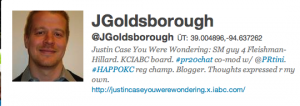“My tweets are my own” is a trend that is rapidly making its way across the social space. It’s also a trend that doesn’t make sense. Why is this something that needs to be stated?

The purpose of putting disclaimers on Twitter is to differentiate from the brand you work for and their ideals/views. My boss puts “Thoughts expressed are my own” which makes more sense. From an agency standpoint, we represent not only our company, but the brands we work with on a global scale. The words “thoughts” and “expressed” are the differentiator.
That tiny disclaimer will not change the perception that someone might have about you. Most will correlate your actions, tone and approach with the company that you work for and represent. In the Google age, it’s impossible to hide who you work for for long.
Having worked on the agency, corporate and vendor side, I can assure you that most companies put social guidelines in place so that employees represent not only themselves, but the brand in the best light. The mentality of brand first, you second is rampant in all sectors of the professional space.
Example: While on the brand side, we went through the RFP process. We didn’t ask agencies to present if a.) individuals were extreme in politics/religion discussion; b.) cussed a lot and it came across negatively; and c.) blasted brands and others on a regular basis. Those were types we didn’t want associated with our brand – and most, from experience, are like that.
Brand Complaints
There are a lot of customer service issues out there. Frustration drives a lot of negativity online, especially in the CS space. Social CRM is a hot topic for a reason – it’s a way for companies to build relationships, and to manage complaints and respond efficiently, while remaining true to the brand.
Working at a large agency means that it’s easy to be unaware of who is a potential or current client. New business is a big part of most agencies, and it’s easy to run off your mouth when you’re frustrated. The last thing a supervisor wants to receive is a call from one of their bosses, or worse, the client. Everything that is said on social platforms is open to the public, unless you’re private. That complaint on Twitter might be a good idea, but it could backfire as well.
If frustrated by a brand, I suggest that you create a desktop word document of all the “Things I Wish I Could Tweet” and write it there. If a complaint must be said, try to be constructive and positive about it.
(Disclaimer: AT&T is a Fleishman-Hillard client) A “Hey AT&T, my phone isn’t receiving voicemails. Are there any quick tips or hard re-sets for this?” is much better than “Wow @AT&T. Your service completely blows and I’m not even getting my calls.” When brands evaluate from their respective response playbooks, it’s easy to be marked as a “rager” or just angry without merit when reacting quickly. Then, if you do receive great customer service, praise them. That, instead of raging, is what agencies want potential clients to see. A brand wants to be represented by those that are thought leaders, positive and utilize constructive criticism in a positive way.
Religion and Politics
The best advice ever given is from my Dad. He states that “You are only judged by the information you give them. Selective transparency attached to a dynamite personality is how great businessmen are created.” I was only 10, but it resonated. If you are a friend of the family, you know our history with communist governments and who my grandfather was. Even then, we see no need to share our viewpoints in a professional atmosphere. The traditional “what you don’t say around the water cooler” definitely applies even more so in the social space. Many companies are non-partisan and want to appeal to an entire audience – not just your beliefs. Correlation is key – what s said will automatically represent your company and/or clients.
So, before posting or tweeting, think about it. Is it something that you would put on a billboard and be ok with clients and your boss driving by? Is the disclaimer even needed, other than appeasing legal departments?
You tell me. What do you think? Leave a comment below.




